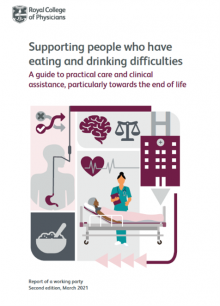
Supporting people who have eating and drinking difficulties is a guide to practical care and clinical assistance. Its particular focus is on the complexities that can arise around nutrition and hydration towards the end of life.
The guidance updates the previous Oral feeding difficulties and dilemmas published in 2010, particularly in relation to recent changes in the law governing procedures for the withdrawal of clinically assisted nutrition and hydration (CANH) and other life-sustaining treatments.
It was developed by a working party with representation from a wide range of specialties, including neurology, dietetics, speech and language, gastroenterology, law, ethics, and care of older people.
Eating and drinking are essential for maintenance of nutrition and hydration but are also important for pleasure and social interactions. The ability to eat and drink hinges on a complex and coordinated system, resulting in significant potential for things to go wrong.
Decisions about nutrition and hydration and when to start, continue or stop treatment are some of the most challenging to make in medical practice. The newly updated guidance aims to support healthcare professionals to work together with patients, their families and carers to make decisions around nutrition and hydration that are in the best interests of the patient. It covers the factors affecting our ability to eat and drink, strategies to support oral nutrition and hydration, techniques of clinically assisted nutrition and hydration, and the legal and ethical framework to guide decisions about giving and withholding treatment, emphasising the two key concepts of capacity and best interests.
The guidance is primarily for medical and healthcare professionals, particularly those involved in caring for people who have eating and drinking difficulties, including gastroenterologists, ward nurses, geriatricians, dietitians, speech and language therapists, neurologists, palliative care teams, care home and community nurses.
Updated throughout, it includes a new chapter on dietary modifications and a series of illustrative examples of patients to help guide practice.
It has been endorsed by the British Association for Parenteral and Enteral Nutrition, British Dietetic Association, British Geriatrics Society, British Society of Gastroenterology, Dementia UK, Malnutrition Task Force (Age UK), National Nurses Nutrition Group, Royal College of Psychiatrists, and Royal Pharmaceutical Society.
To access the guidance, please visit: www.rcplondon.ac.uk/file/28796/download